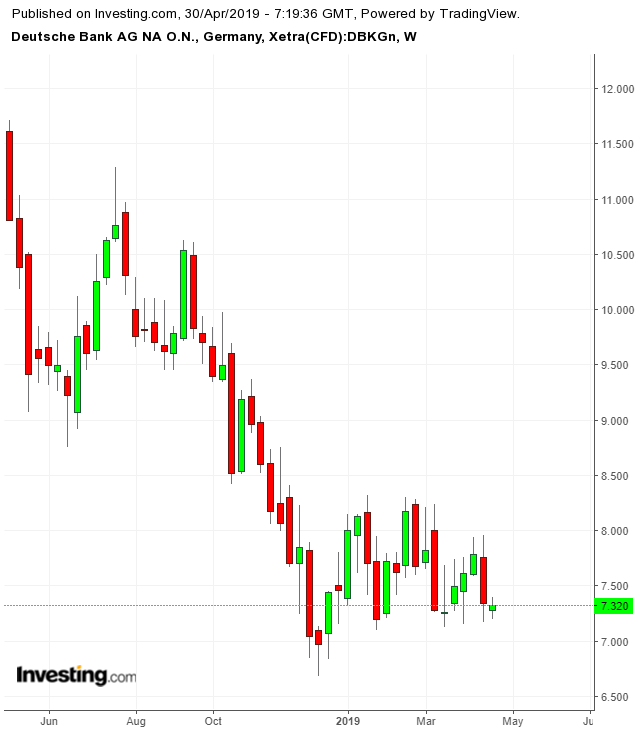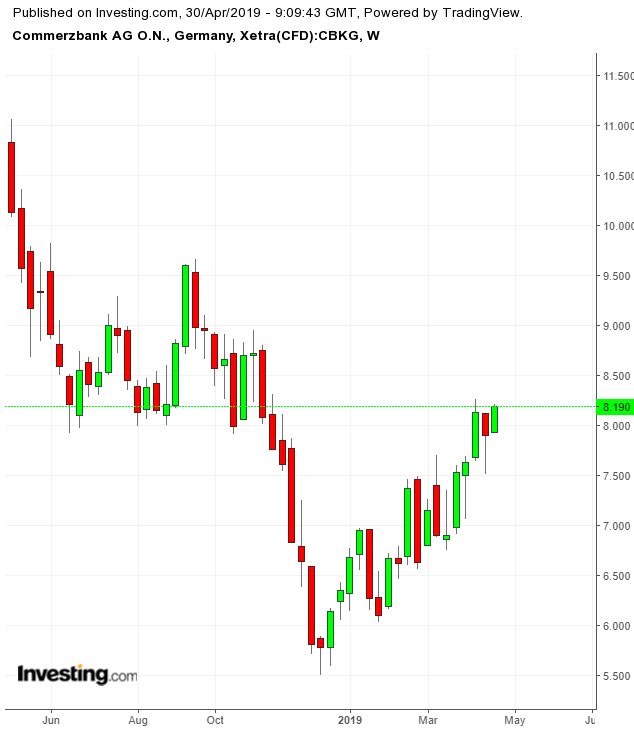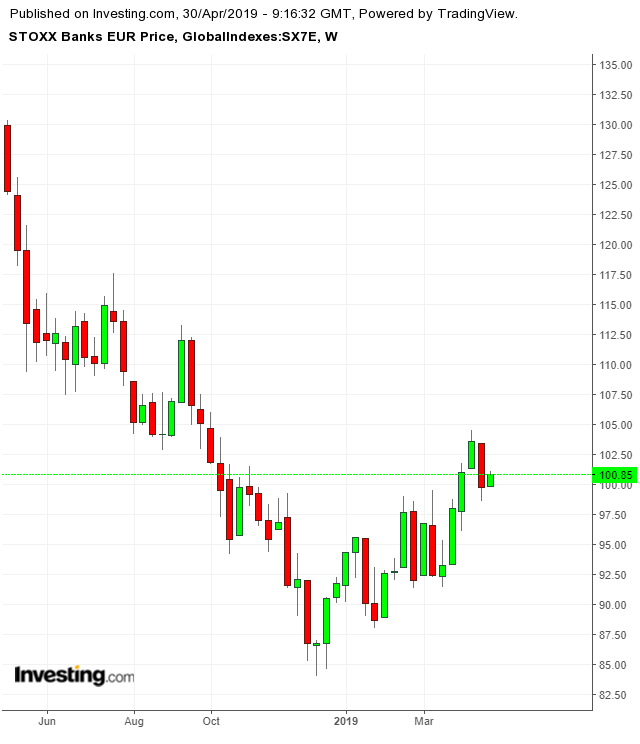Germany’s two biggest lenders, Deutsche Bank (DE:DBKGn), (NYSE:DB) and Commerzbank (DE:CBKG), (OTC:CRZBY) called off negotiations regarding a potential merger last week, signaling that troubles in Europe’s banking sector run too deep for any easy remedies.
After six weeks of talks, the global banks said they concluded that the expected benefits of a combination would not justify the “additional execution risks, restructuring costs and capital requirements associated with such a large-scale integration.” The two lenders are emblematic of everything that’s wrong with Europe’s ailing banking industry—deep-seated structural problems, high costs relative to revenue, low profitability, threat to market share from aggressive U.S. rivals and a lack of answers to competition from fintech companies.
“Deutsche’s biggest problem remains its cost base, which remains well above a lot of its comparable peers, along with outdated IT systems,” Michael Hewson, chief market analyst, at CMC Markets, a London-based brokerage, said by e-mail on Friday. “Quite simply the problems facing Deutsche are still too large to make it a compelling takeover partner, let alone a merger partner.”

Deutsche on Friday reported a 9% drop in first quarter revenue from a year earlier to 6.35 billion euros ($7.08 billion). This was the ninth consecutive quarter of falling revenue, which also prompted Chief Executive Officer Christian Sewing to cut the lender’s 2019 revenue outlook. Just last month the bank forecasted a slight increase in revenue, but on Friday they revised that to “essentially flat.”
Profit before taxes fell 32% to 292 million euros ($326.03 million) from 432 million euros ($482.35 million) in the same quarter last year. Revenue at the corporate and investment bank division fell 13%, driven mainly by a slip in earnings from fixed income and equities, which dropped 19% and 18%, respectively. The numbers “highlight how the bank is fighting a losing battle to turn itself around,” according to Hewson.
Deutsche is still reeling from several scandals, including a $7.2 billion settlement with the U.S. Department of Justice in a case related to the sale of mortgage-backed securities in the lead-up to the global financial crisis. As well, the bank faces fines, legal action and the possible prosecution of “senior management” because of its role in a $20bn Russian money-laundering scheme, Britain’s Guardian newspaper reported last month, citing a confidential internal report.
In addition, multiple U.S. government authorities, including the U.S.'s House Intelligence and Financial Services committees as well as the House's Ways and Means committee, plus New York state legal authorities are looking into the bank’s record on loans to President Donald Trump's family-owned business the Trump Organization. Adding to this particular set of headwinds, yesterday, Trump, his children and his real estate businesses filed a federal suit to block Deutsche Bank (and Capital One Financial (NYSE:COF)) from complying with the congressional subpoenas, calling them a form of harassment.
As for Commerzbank, the German government still owns a 15% stake, after a 2009 bailout. Profitability is pressured by toxic assets, including a 8.4 billion euro portfolio ($9.38 billion) of risky Italian government debt.

Though Deutsche bank managed to turn a small annual profit last year, its first in four years, Commerzbank’s returns have remained subdued. Shares of both lenders have lost more than a third of their value in the past year. Over the past decade the declines are more than 80%.
Investors reckon the shares are worth less than each company's liquidation value. Deutsche’s shares have been trading at about a quarter of its book value, Commerzbank’s at about a third.
Collective Market Cap of European Lenders Shrivels
The two German financial institutions aren't unique either. Last year the collective market cap of European lenders shrank by 330 billion euros ($368.46 billion). Indeed, at this point, most major European banks trade at less than their book value.
As a group, they are valued at just 60% of their net assets compared with a 10% premium for major U.S. peers, according to Bloomberg data, cited by Stephen Pope, managing partner at Spotlight Ideas, in a Forbes post. One reason for the underperformance is that Europe’s banking market is overcrowded, leading to declining profitability.
This, combined with outdated business models, the persistence of negative rates and political uncertainty resulting from Brexit and the rise of populism, is the source of the European banking industry’s troubles, according to Pope.

The STOXX Banks EUR Price has lost 22% over the past 12 months. Despite the tempting valuations, most European banking stocks may be better left for risk-savvy investors.
Of course, not all European lenders are created equal. Britain’s Lloyds Banking Group (LON:LLOY), (NYSE:LYG), which, similar to Commerzbank also required state aid during the financial crisis, has conversely been deemed a turnaround success story. Its chief executive, Antonio Horta-Osorio, sold foreign assets, overhauled the bank’s product range and modernized its technology, enabling the U.K government to exit the lender.
Lloyds shares have gained 30% this year. Its profit before tax last year rose 13% to 5.96 billion pounds ($7.70 billion), it said in February. Its first quarter earnings report is due this week. Its return on tangible equity (ROTE), a measure of profitability, last year was 11.7%, up from 8.9% in 2017. The bank’s ROTE target for this year is 14%-15%. Deutsche Bank’s ROTE target for 2019 is 4%, the lowest among its peers.
